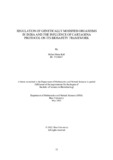Regulation of genetically modified organisms in India and the influence of Cartagena protocol on its biosafety framework

View/Open
Date
2022-05Publisher
Brac UniversityAuthor
Kafi, Maher JibranMetadata
Show full item recordAbstract
Genetically modified organisms (GMOs) are the products of modern-day biotechnology
techniques. One prominent example which highlights just how popular GMOs have become,
is that of genetically engineered (GE) plants. As per the International Service for the
Acquisition of Agri-biotech Applications (ISAAA) report for the year 2019, 190.4 million
hectares of land across 29 different countries is used for growing these crops. The specific
country selected for this study is India. Considering GMOs at large, a vast number of
regulations have been laid down by different organizations in this nation, with the motive of
maintaining biosafety. One of the main pillars of this system is the Cartagena Protocol on
Biosafety (CPB) to the Convention on Biological Diversity. In this study, the extent to which
regulation regarding GMOs has changed over the years has been analyzed. The influence of
the CPB on those changes has been noted, as this can help to assess how much of an impact
the Protocol has made to the regulatory framework for GMOs.
